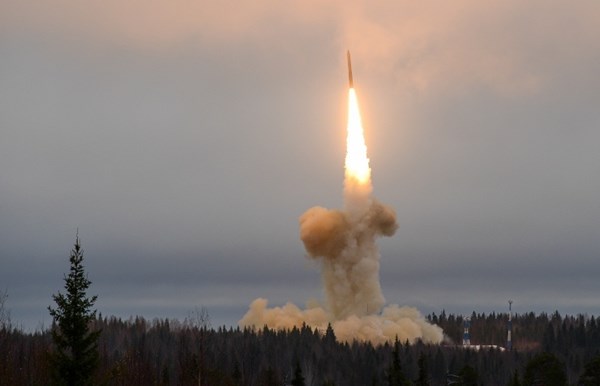Flight tests of Russia's latest Satan ballistic missiles will begin in 2017
The Krasnoyarsk Machine Building Plant will begin flight and engineering tests of a modern RS-28 Sarmat liquid-fueled intercontinental ballistic missile (ICBM) in 2017, as was reported by Russia's Interfax news agency citing sources in military industry.
"Krasmash and other enterprises engaged in the production of these ICBMs, are preparing them for testing which is expected to begin this year," the news agency’s interlocutor said. Earlier, the Russian Defense Ministry stated that the Sarmat rocket system (RS) would be adopted in 2019-2020.
In September, a source familiar with the situation reported that the flight design test of the Sarmat ICBMs are scheduled to begin in 2018.
According to experts, the RS-28 Sarmat ICBM will be able to deliver multiple warheads weighing up to 10 tons anywhere in the world through either the North or South Poles.
The Sarmat will also be used to carry hypersonic blocks, and in particular, an aircraft referred to by the press as ‘Object 4202’, a creation of NPO Mashinostroyeniya (a rocket design bureau based in Reutov, in the Moscow region).
The RS-28 Sarmat ICBMs will replace the world's most powerful strategic silo-based missile, the RS-20V Voevoda (according to NATO classification – SS-18 Satan) in the Uzhurskaya (Krasnoyarsk Krai) and Dombarovskaya (Orenburg region) divisions of the Strategic Missile Troops of the Russian Federation (RVSN RF).
Russian military experts believe that the presence of the Sarmat ICBM groupings in Russia will deter the U.S. from plans to deploy a global missile defense system. This is caused, in particular, by Sarmat’s ability to deliver warheads and strikes from different directions, including the transit of nuclear weapons over the South Pole.
In addition, heavy stationary ICBMs enable the RVSN RF to solve new, unconventional tasks. It serves as a resistance to the U.S.’s concept of a global instantaneous impact by conventional means. It is believed that the heavy ICBMs, being fit with high-precision warheads will be the most relevant response to the implementation of the Pentagon’s program.
The Commander of the Strategic Missile Troops, Colonel General Sergei Karakayev, speaking about the prospects of the Sarmat missile system being deployed within the Russian army, told reporters on December 17th last year that "the approximate schedule of acquiring the complex is 2019-2020."
The Sarmat ICBM was developed at the State Rocket Center and was named after Academician V.P.Makeev. Its serial production will be adjusted at the Krasnoyarsk Machine Building Plant.
